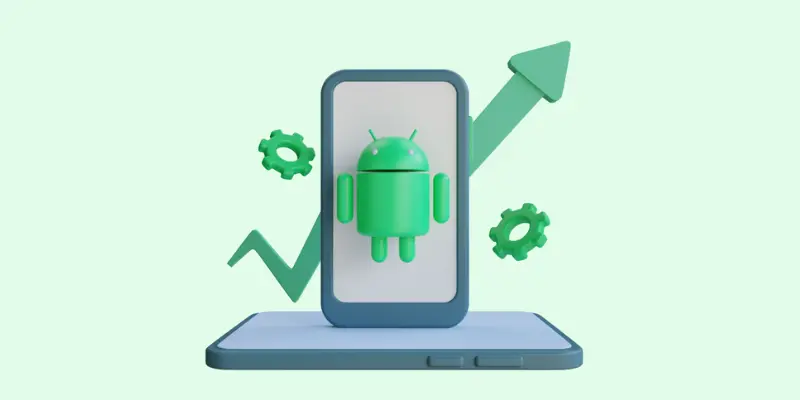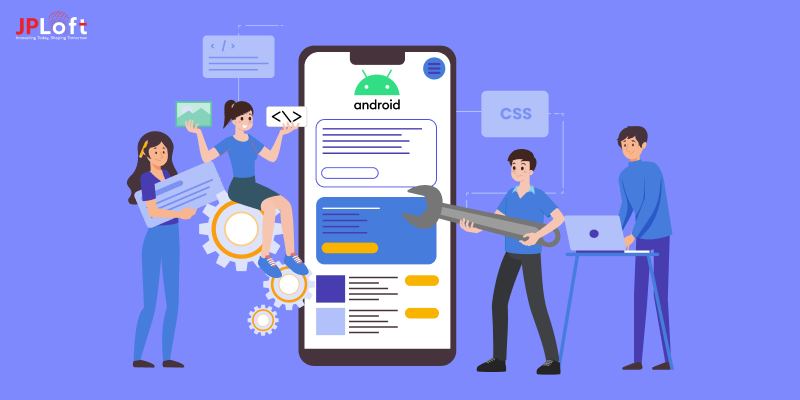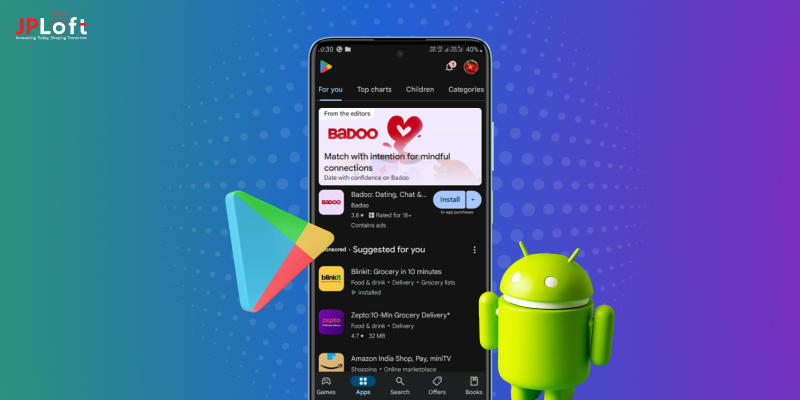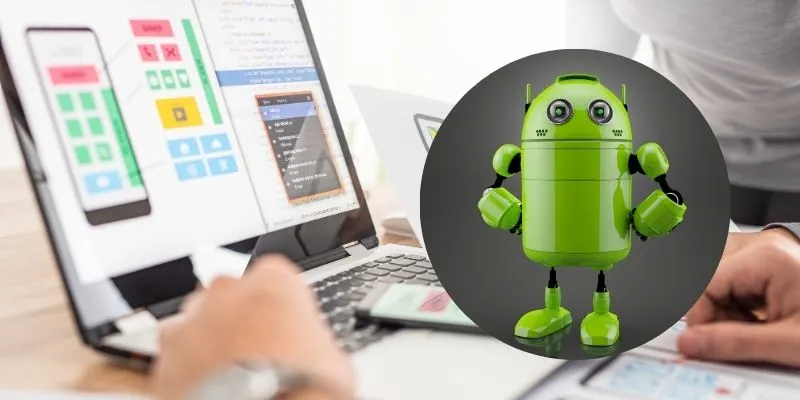To survive in the virtual landscape, businesses must become familiar with emerging android app development trends. Today, a smartphone or well-designed application is the key to success in the internet world. As a result, brands all over the world are embracing mobility solutions to improve their operating and business models and attain stability in this volatile market.
Indeed, mobile apps assist businesses in attaining this level. The mobile app market was estimated to reach $693 billion in 2022, and Android is the most commonly used operating system and boasts a wide consumer base. Android app development services control 73% of the market share, claims Statista. Consequently, the industry developing Android apps is expanding at a crazy speed.
From 5G to Machine Learning to instant applications, the world of Android is full of happenings. With the introduction of new innovations, Android application development trends have become more prominent. According to the BBC report, cell phones are used for 4.8 hours every day, primarily for apps; hence, understanding ongoing trends is essential. If you wish to use Android app development solutions, you need to be aware of the trends that are overpowering the market at present and in the future. This will help you ensure that your program will satisfy customer expectations and, lastly, competitors.
Why Rely on Android App Development?
Businesses today know how mobile apps could increase their customer base and captivate a larger audience in the digital era. Nowadays, the Android operating system controls much of the creation of mobile apps. Over 2.5 billion active users worldwide already exist, and their count is continually rising. Furthermore, its enticing advantages, including wide customer reach, seamless customisation, faster deployment, improved scalability, and many more, make it a significant platform for companies.
Anyone can create an Android app on a device without requiring a particular OS to design the app. Android application development brings scalable features with it, and there is absolutely nothing to be concerned about if user interest changes or if current trends vary. Android is designed on open-source innovation, so coders can easily personalize the software according to tailored preferences. Going for developing an Android app is much more cost-friendly than relying on iOS app creation. The developer community is active enough and offers numerous tutorial materials and assets. Android apps can operate on a plethora of gadgets, such as phones, tablets, smart TVs, and smartwatches, which helps enhance the app's reach. Android app development services are capable of getting integrated with Google-based services like Google Analytics, Google Maps, and Google Play Services, which provide a remarkable consumer experience.
How Should You Choose the Correct Android App Development Company?
If you wish to implement the latest mobile software technology trends in your app, you should hire Android app developers. Before finalizing a mobile app development firm, you can test it on these key points.
-
You can track the company's past record and look at its portfolio. Also, analyze if they have incorporated recent app development technologies into the projects. This will reassure you that, if you are working on a new software app, they are the ideal fit for your project.
-
If you choose to hire skilled developers for your project, it will work miracles. Working with seasoned developers, however, makes the road to Android app development more clear. Those with experience are the ones who have handled critical mistakes in the past and managed their way out of them. This assures you that, if they come across any problem during the job, they will handle it with ease.
Top Android Application Development Trends in 2024
-
Machine Learning and Artificial Intelligence Implementation
Among the fastest-developing trends in mobile apps are artificial intelligence and machine learning. Artificial intelligence (AI) and machine learning (ML) technologies are increasingly being used in Android app development.
The numbers support its popularity and explain why this trend is the most likely one. The worldwide AI market is predicted to be worth two trillion USD by 2030. These technologies can enhance app functionality and user experiences through personalized suggestions, task automation, app intelligence, and responses to user input.
Here are some of the instances of AI and ML execution in some of the famous Android apps.
-
Google Photos: The app executes AI to manage and classify pictures, making it convenient to assist users in searching for and sharing particular photos.
-
Spotify: The application uses ML algorithms to generate tailored playlists according to users' listening preferences.
-
Netflix: The app leverages a customized system, using machine learning, to recommend movies and TV shows that people most probably enjoy.
-
Google Maps: This app uses AI algorithms to estimate traffic patterns, suggest routes, and use ML to enhance search result accuracy.
-
Amazon Alexa: It evaluates voice requests and responds precisely using Machine Learning and NLP (natural language processing).
Mobile apps can also use artificial intelligence and machine learning technology to offer more dynamic and engaging user experiences, such as predictive text input, virtual assistants, and chatbots. These technologies can help improve the security of the app by providing options like facial recognition or fingerprint scanning.
-
Predictive Analytics
Predictive analytics, a subfield of data analytics, uses statistical models, past data, and machine learning algorithms to forecast behaviour or upcoming events. It is used in many diverse fields, including healthcare, marketing, finance, and plenty more. Regarding mobile app development, predictive analytics is quite important for enhancing the user experience through tailored actions.
A music streaming service could use predictive analytics to suggest songs to consumers based on past musical access. An e-commerce app can also use predictive analytics to suggest products based on browsing and purchase patterns, therefore boosting user involvement and retention. Additionally, predictive analytics are used to boost focused marketing. Analysing consumer data helps an application identify trends that might be used to specifically target a given user group with tailored offers and discounts.
-
AI-Powered Chatbots
Android apps are increasingly featuring chatbots to offer consumer care and help. AI-powered chatbots are software programs designed to replicate human communication, allowing users to connect with an app via natural language input.
Tools like Dialogflow, a Google platform designed to let developers construct conversational interfaces for many platforms, including mobile apps, let chatbots be integrated into Android apps. Most companies (57%) say using a chatbot yields a notable return on investment (ROI), even with little financial input.
Chatbots can guide users at all times, further improving user satisfaction. They also use data related to users to offer customized assistance. Android apps can feature chatbots using tools like Dialogflow, a Google platform meant to allow developers to create conversational interfaces for multiple platforms, including mobile apps. Chatbots can understand easy tasks and respond to queries, lowering the need for customer service representatives. These AI-based chatbots can manage different conversations at the same time, enhancing the app's scalability.
-
Augmented Reality and Virtual Reality
With a global growth rate of 25.3%, augmented reality (AR) and virtual reality (VR) technologies are fast gaining favour. In the following year, they are supposed to be more important for the creation of Android apps. These technologies make it possible for consumers to have engaging and immersive interactions. They can be applied in several ways to increase an app's usability and usefulness.
While VR technology generates a totally simulated experience for the user, AR technology lets digital information overlay in the real world. From gaming to education to tourism and beyond, both technologies offer incredible uses in many sectors. Including AR and VR technologies in their apps might be a great approach for Android app developers to set their products apart and give consumers interesting and distinctive experiences.
-
Instant Apps
Google launched instant apps, which let users access only a portion of an app's capabilities without downloading it on their device. This lets customers test the program before downloading it and enables developers to offer a more flawless user experience by eliminating the necessity for consumers to deal with the app store.
Before utilising a traditional app, customers must download and install it from an app store. Conversely, instant apps let users access a limited set of features without having to install them. Instant apps, which have been downloaded over 3 billion times, offer great potential for 2024 despite accounting for only 0.13% of all apps. Potential applications of these apps include gaming, e-commerce, entertainment, and applications that offer information or access to certain features. An e-commerce instant app lets customers view items and make a purchase without installing the whole program. On the other hand, a gaming quick app might show players a game's prototype so they may test it before deciding whether to download it or not.
-
5G
5G technology is referred to as the fifth generation of mobile networking and claims to enhance the capacity and speed of the internet connection. One can stream films, play games, upload or download data at a faster speed, and access technologies, including AR and VR, by using 5G. 5G will drastically change Android app development by letting creators produce fresh, more immersive, and interactive user experiences. Leveraging 5G in app development extends new opportunities and enhances the demand for data-intensive offerings. Developers will have fresh chances to create creative and interesting apps that leverage the higher speed and capacity of 5G networks as 5G networks continue to spread out and become more generally accessible.
-
MetaVerse
Metaverse is another futuristic Android mobile app development idea. Through AR/VR and other technologies, the metaverse lets consumers enter a virtual environment with a virtual identity and experience immersive virtual reality. With the arrival of the metaverse, mobile app development is entering an unparalleled new phase.
A metaverse app is one designed with all the required technologies to operate in the metaverse environment. Among the often-used metaverse apps are MOBOX, Sandbox, Epic Games' metaverse apps, and Decentraland.
An Android metaverse game software called MoBOX allows one to exchange NFTs. The Google Play Store hosts easily accessible metaverse Android apps. Although metaverse app development is still in its early years, advanced technology will finally help it flourish. Hire dedicated developers who will help you create metaverse apps appropriate for Android. The number of Metaverse users is booming day by day. A Statista analysis forecasts that the metaverse market will expand to USD 507.8 billion by 2030 and that the number of users will shockingly rise to 2633 million by then.
-
Apps for Foldable Gadgets
Foldable devices, such as tablets with flexible screens and cellphones, are growing in popularity and should be more freely available in the next year. These gadgets provide a more flexible experience by letting users move between the standard smartphone form factor and a bigger tablet form factor. When foldable smartphones are considered, market growth is forecasted to reach $54.5 billion by 2028.
By using the special qualities of foldable devices, such as their bigger screens and flexible form factors, these apps may offer an interesting and engaging user experience. Specialized apps for foldable devices have one advantage in that they enable a more ideal user experience. Additionally, the development of specialized apps for foldable devices could boost their acceptance since they give users more useful and interesting experiences, making them appealing to a broader spectrum of consumers.
-
Cloud Integration
From a projected $197 billion in 2023, Statista estimates that global SaaS end-user spending will reach $232 billion by 2024. Based on the numbers, cloud integration is one of the billion-dollar Android app development trends that is likely to become popular.
Cloud integration refers to both application and data integration, thereby allowing data to flow between apps without interruption and enabling apps to interact with one another by means of instructions and requests that initiate simple processes.
Android includes cloud services using APIs and SDKs from cloud service providers. This helps exchange data and processes between Android apps and cloud servers. Among the trends in app development, this one breaks down disparities in data and improves business agility.
-
SaaS-based Services
Changing from digital streaming platforms to subscription-based services gives app development trends new significance. By using subscriptions, these services create fresh corporate revenue models.
Netflix, Headspace, and Amazon are well-known subscription-based companies. Once you pay a set fee for a designated period, these services enable you to enjoy goods or services. This trend in Android mobile app development is becoming rather well-known in fields including healthcare, fitness, education, entertainment, and IT. The subscription service business has been pushed by growing disinterest in traditional TV programming and growing interest in OTT content. The subscription market is projected to be USD 1 trillion by 2025.
-
User Experience Focus
Since user retention and application loyalty depend heavily on a flawless user experience, it is becoming increasingly important in mobile app development. As apps become increasingly competitive, developers have to create aesthetically beautiful and readily navigable apps with a flawless user experience.
One way to attain this is to rely on design frameworks, like Material Design by Google, which offer guidelines for generating attractive and consumer-oriented applications. These so-called frameworks ease the development process overall and guarantee app consistency on multiple platforms and gadgets.
User testing is a necessary component of the user experience since it allows developers to get insightful comments on how users interact with the app and spot any problems or areas for development. These comments can then be used iteratively to improve the program's usability and user experience. Furthermore, analytics and data tracking instruments can grasp user behaviour, preferences, and involvement, enabling developers to pinpoint areas needing development and produce customized results.
-
Modular App Development
Modularization and app bundles are standard elements in Android application development. They offer numerous benefits, including updates, maintenance, and amplified app performance and size. App bundles are multiple features or apps packed into one bundle that are installable as a single unit. This helps in the effective dissemination and installation of the apps and ensures a reduction in the app's overall size. By segregating the software into smaller modules, coders can manage every module, which tends to improve the overall operation of the application. On the other hand, modularization explains the app's breakdown into independent modules. Further, these modules can be conveniently maintained, facilitating app upgrading and modification.
Furthermore, modularization improves program efficiency. It lets developers load just the required modules at a given moment, limiting the total app size. Using these strategies, big app developers, including Google, Facebook, and Airbnb, have seen app size and performance enhancements.
-
Blockchain Apps
A blockchain is a distributed ledger system in which transactions are logged over a computer network and spread widely. It drives cryptocurrencies like Bitcoin and Ethereum and finds possible use in digital identity, supply chain management, healthcare, banking, real estate, and many other sectors. 8% of companies worldwide are implementing blockchain technology. The share of overall blockchain market value among different sectors is the largest in banking.
In the case of Android app development, blockchain can enhance the reliability and safety of app-based transactions. The decentralised trait and employing cryptography make sure that the data is shielded, tamper-proof, and can offer immutability to transfers. This can be advantageous to apps that can manage sensitive details, like healthcare or financial applications.
In addition, blockchain apps can potentially revolutionize sectors via decentralized systems. For example, blockchain-oriented supply chain management apps can increase the effectiveness of supply chain operations. On the contrary, blockchain-powered voting apps likely increase the safety of the overall voting process.
-
IoT-Enabled Mobile Apps
IoT is among the best-known developments in Android app development. IoT, sometimes referred to as the Internet of Things, is the interlinking of physical objects, such as sensors, cameras, and appliances, incorporated with internet connectivity and able to acquire and distribute data. This innovation enables enhanced control and automation of the devices via mobile applications.
By leveraging IoT-empowered mobile software, you can magnify automation and effectiveness through association with IoT devices. To consider an example, a smart home application can check different household devices for safety purpose, such as security cameras, lights, and thermostats.
An IoT-enabled health app can help save lives by tracking vital signs and alerting healthcare providers in an emergency. Moreover, IoT technology can improve the user experience through tailored services and recommendations. A retail app might monitor consumer behaviour and generate tailored product recommendations depending on preferences and browsing history. The worldwide revenue from IoT applications, platforms, and services is projected to be 750 billion USD by 2025, so IoT devices are becoming increasingly household names and inclusive.
-
Android Jetpack
Android Jetpack comprises a set of libraries and tools for Android app development that Google developed to simplify the development process. It offers pre-built, tested components, including lifecycle management, data binding, and navigation, that fit readily into an app. By using Android Jetpack, developers can shorten development time and boost app stability. It also controls daily chores, including background jobs, security, and navigation, and offers backward compatibility.
One of the major advantages is that it guides developers to be attentive to the app's unique functionalities instead of wasting time on monotonous tasks and boilerplate code. Saving developers time and effort helps them produce apps faster and with fewer errors. Another advantage is backward compatibility; that is, apps created with Android Jetpack will remain functional on earlier versions of Android. This helps developers target a larger audience and cut the need for updates and upkeep.
-
On-Demand Apps
Often referred to as "Uber for X," on-demand apps have grown in popularity recently since they allow consumers to easily access goods and services by pressing a button. These apps link users with suppliers of several services, including home cleaning, food delivery, transportation, and more.
Users of on-demand apps can request services via the app and subsequently link those needs with suppliers who can meet them. A user of an on-demand transportation app, for instance, may ask for a ride and be linked with a nearby driver. Likewise, a user of a food on-demand app may ask for a meal delivery; the app will then link them with a local restaurant. Consumers adopting on-demand apps gain convenience, speed, and flexibility, among other things. Services and products are easily accessible to users without their having to visit or call a physical location. Furthermore, on-demand apps usually provide a large spectrum of choices at reasonable rates.
On-demand apps also offer companies several advantages. They can raise awareness, attract a larger audience, and offer insightful customer behaviour and preference data. Through process automation and provider connections, on-demand apps can also help companies lower costs and boost productivity.
-
Multi-language/Multi-regional Assistance
With a growing number of users relying on the Internet via smartphones, companies recognize the vitality of targeting a worldwide clientele. By designing applications that support different locations and languages, firms can ensure that the apps are usable by people irrespective of their locality.
Globalization of applications through multi-language and multi-region support not only expands the possible user base but also enables companies to customize their apps to particular places, therefore increasing their relevance and use by users in those areas. Furthermore, encouraging several languages might help raise engagement and retention rates since users are more likely to keep using an app if they can interact with it in their favourite language.
-
Super Apps
The trend of building all-in-one platforms with a broad spectrum of services, including communications, transportation, payment processing, and more, that reflect super app development is clear. These apps are designed to allow users access several services inside one app, therefore offering an easy and seamless experience. This saves users effort and time by eliminating the need for them to move between different apps continually.
Top-rated in both global and Asian markets, where businesses like WeChat and Gojek have achieved tremendous success, super applications were originally developed in China, Indonesia, and India. These apps are increasingly spreading to other countries as well. Super apps are estimated to find popularity in other areas as the globe becomes more mobile-first. Companies are funding the development of these apps since they realize they could offer a one-stop solution for their clientele's needs. Super app development is forecasted to become an important element of the business to target the users. They hold the potential to become mainstream in the near future.
Final Thoughts
If developers of Android apps wish to be ahead in their sector, they have to keep informed about the newest trends and technologies. Discussed are many significant trends that will affect the direction of Android app development: the growing use of 5G networks, the expanding application of machine learning and artificial intelligence, and the advent of multi-platform development tools. Staying current and adjusting to these trends will help developers create original and creative apps that satisfy consumer expectations and needs.
Working with a seasoned mobile app development company guarantees that your Android app will be created using industry best practices and the most recent technologies, guaranteeing the highest standards. Once they collaborate with you, they will understand your particular needs and create customised software that meets them.












Share this blog